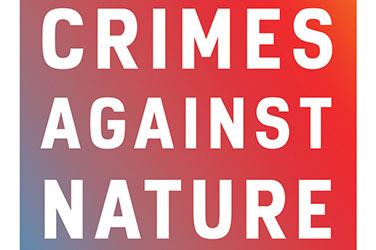
- Free Article: No
- Contents Category: Politics
- Review Article: Yes
- Article Title: Crime without punishment
- Article Subtitle: Capitalism’s environmental carnage
- Online Only: No
- Custom Highlight Text:
There is a debate as long-running as climate change itself: can capitalism, with its demand for endless growth, be sustained on a planet with finite bounds and limited resources? Freemarketeers say yes. For them, the issue is not capitalism per se but an economic model that does not factor in the true cost of emissions. As a result, we the people and the planet are subsidising industries that pollute for free. The counterargument is based on simple intuition: How on earth can capitalism, the unstoppable force be contained inside the inelastic object? This has never received a convincing reply.
- Article Hero Image (920px wide):

- Article Hero Image Caption: Jeff Sparrow, author of <em>Crimes against Nature: Capitalism and global heating</em> (photograph courtesy of Scribe)
- Featured Image (400px * 250px):

- Alt Tag (Featured Image): Kurt Johnson reviews ‘Crimes against Nature: Capitalism and global heating’ by Jeff Sparrow
- Book 1 Title: Crimes against Nature
- Book 1 Subtitle: Capitalism and global heating
- Book 1 Biblio: Scribe, $29.99 pb, 240 pp
In Crimes against Nature: Capitalism and global heating, Jeff Sparrow explores this latter question through a series of essays that mount an extended critique of unrestrained capital. In its late stage, capitalism warrants criticism more than ever. Yet by staging his critique in the factories of the industrial, Bolshevik, and postwar consumerist revolutions rather than in the fields, forests, or the savannah, Sparrow risks leaving out an account of “what makes nature worth saving” in the first place.
Sparrow defines nature broadly so as to encompass human nature. This is not a bait and switch. As he explains, the two were once a unified whole, but wage-based labour has broken our connection with the land and the seasons, pried us away from our native environment. In a less proficient writer, the lumpy exposition needed to support these claims and to explain, for example, the inverse relationship between public and private wealth aka the Lauderdale Paradox, might become indigestible. Yet Sparrow’s longitudinal erudition seasons his accounts with a diversity of ideas to make them not only palatable but, at times, build to a crescendo in which flowing prose somehow harmonises with the graininess of science and economics.
When Sparrow lands a punch there is a satisfying crack. His essay ‘Father Abraham and Mrs Consumer’, on fast fashion and the advent of Taylorism and dehumanising factory labour, is grimly fascinating. It recounts Frederick Taylor’s series of experiments on a pig-iron worker named only ‘Schmidt’, who is reduced to a lab rat. The application of Taylor’s conclusions has led to the systematic separation of meaning from work that characterises production lines from Amazon warehouses to the Shenzhen Free Economic Zone. By revealing the origins of the ‘sweat’ in sweatshop, Sparrow shows that the meaninglessness of industrial work is not a historical accident, but rather willfully institutionalised as ‘best practice’ for the sake of profit.
Much of Crimes against Nature is dedicated to other instances in which one’s economic advantage is another’s degradation: Edward Bernays’s techniques for discrediting the dangers of smoking have been repurposed for climate denialism; the Keep America Beautiful campaign backed by Big Plastic blamed the explosion of non-biodegradable waste on consumers; cities’ once communal spaces in which most transport was public became subordinated to the demands of the modern automobile industry. The conclusion is that neither the modern consumer nor the worker is an empowered individual, but rather a social agent delimited by a single choice: opt in or opt out (as if the latter were possible).
With more ambivalence, Sparrow eyes the environmental destruction wrought in the ‘second world’ in his essay, ‘War on Nature’. Here, he traces the influences of Stalinism on the West’s left: massive environmentally destructive projects like Stalin’s White Sea Canal, connecting the Baltic and White Seas, were seductive for their scale and labour mobilising potential. While all nuclear powers of the Cold War left radioactive deserts and atolls from which native inhabitants were inadequately evacuated, only the socialist countries had that spiraling madness that comes with re-engineering society from the ground up. Only such madness could lead to anything like today’s Aral Sea, a once vast body of water that has almost vanished after its source rivers were diverted for Stalin’s dream of growing cotton on the Kazakh Steppe. For this reviewer, few environmental debasements compare to the Uzbekistani town of Muynak in which a pier extends not over ocean but into the desert, where the only reminder of what once was, are rusting ships and shells mixed with toxic chemicals from fertilizers and pesticides that still cause cancer and illness in the few remaining inhabitants.
Sparrow turns his sights on the environmental movement, too. In ‘People, People, People’, he attacks the Malthusian argument, often taken up by environmentalists in a tight spot. The planet, they claim, has a natural carrying capacity. While this initial premise is true, the back-of-napkin mathematics used to justify neglect of a poor and wretched ‘underclass’ as a necessary evil has been thoroughly disproved. Sparrow critiques the historically racist roots of the conservation movement, with its impulse towards purity. Conservation is also underpinned by the colonial idea of a wilderness – a wild expanse of fauna and twilit forests curiously empty of native inhabitants. This allows for a convenient redefinition of invader and invaded into explorer and wild frontier.
In his historical analysis, Sparrow is penetrating, but suffers from an anthropocentrism endemic to Marxist modes of critique. If the celebration of nature as unknowable is simply a bourgeois conceit, if wilderness is an invention, what is left to protect? All crimes in this book stem from the hubris that nature can be intellectually conquered and exists for humans to exploit, yet its author operates under the very same assumptions. Today the environmental movement is finally listening to First Nations people and absorbing an ethos in which nature is valued beyond mere utility and given the respect that made crimes against it crimes of desecration.


Comments powered by CComment